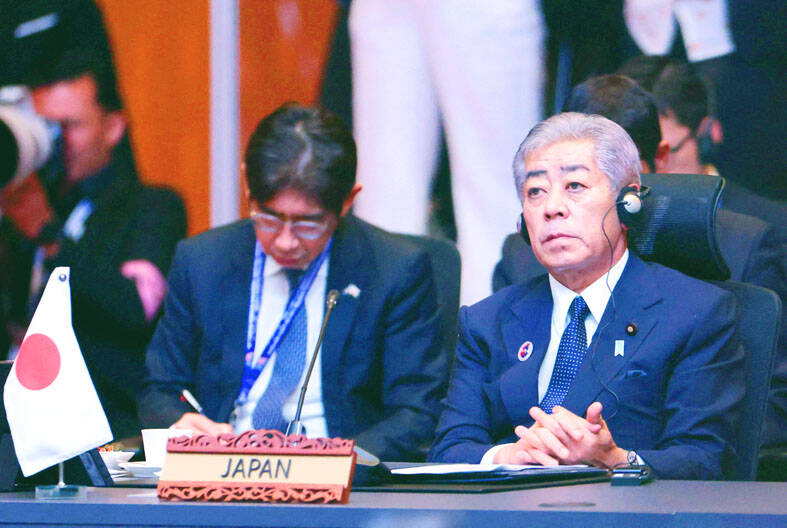China’s military drills around Taiwan are “incompatible” with peace and stability in the Taiwan Strait, Japanese Minister of Foreign Affairs Takeshi Iwaya said during a meeting with his Chinese counterpart Wang Yi (王毅) on Thursday.
“Peace and stability across the Taiwan Strait is important for the international community, including Japan,” Iwaya told Wang during a meeting on the sidelines of the ASEAN-related Foreign Ministers’ Meetings in Kuala Lumpur.
“China’s large-scale military drills around Taiwan are incompatible with this,” a statement released by the Japanese Ministry of Foreign Affairs on Thursday cited Iwaya as saying.

Photo: Reuters
The Foreign Ministers’ Meetings are a series of diplomatic gatherings of ASEAN member states and key partner countries to discuss regional and international issues.
During the Japan-China Foreign Ministers’ Meeting, Iwaya also voiced opposition to attempts to unilaterally change the “status quo” by force or coercion, and expressed Tokyo’s “serious concern” over the situation in the South China Sea.
On Friday evening, Ministry of Foreign Affairs spokesperson Hsiao Kuang-wei (蕭光偉) echoed Iwaya’s concerns, saying that China’s repeated use of pretexts to escalate coercion and military intimidation against Taiwan posed a serious threat to peace and security across the Taiwan Strait and the surrounding region.
Such moves by China have drawn the attention of the international community, Hsiao said, adding that Japanese officials have expressed grave concern over security in the Taiwan Strait and the region to their Chinese counterparts on multiple occasions over the past few years.
He cited as an example the meeting between Chinese President Xi Jinping (習近平) and Japanese Prime Minister Shigeru Ishiba during the APEC summit in Lima in November last year, as well as the Japan-China Foreign Ministers’ Meeting held in Tokyo in March.
Japan’s actions demonstrate its consistent stance of “speaking out when necessary” and its firm support for peace and stability in the Taiwan Strait, Hsiao said.

The US government has signed defense cooperation agreements with Japan and the Philippines to boost the deterrence capabilities of countries in the first island chain, a report by the National Security Bureau (NSB) showed. The main countries on the first island chain include the two nations and Taiwan. The bureau is to present the report at a meeting of the legislature’s Foreign Affairs and National Defense Committee tomorrow. The US military has deployed Typhon missile systems to Japan’s Yamaguchi Prefecture and Zambales province in the Philippines during their joint military exercises. It has also installed NMESIS anti-ship systems in Japan’s Okinawa

‘WIN-WIN’: The Philippines, and central and eastern European countries are important potential drone cooperation partners, Minister of Foreign Affairs Lin Chia-lung said Minister of Foreign Affairs Lin Chia-lung (林佳龍) in an interview published yesterday confirmed that there are joint ventures between Taiwan and Poland in the drone industry. Lin made the remark in an exclusive interview with the Chinese-language Liberty Times (the Taipei Times’ sister paper). The government-backed Taiwan Excellence Drone International Business Opportunities Alliance and the Polish Chamber of Unmanned Systems on Wednesday last week signed a memorandum of understanding in Poland to develop a “non-China” supply chain for drones and work together on key technologies. Asked if Taiwan prioritized Poland among central and eastern European countries in drone collaboration, Lin

NO CONFIDENCE MOTION? The premier said that being toppled by the legislature for defending the Constitution would be a democratic badge of honor for him Premier Cho Jung-tai (卓榮泰) yesterday announced that the Cabinet would not countersign the amendments to the local revenue-sharing law passed by the Legislative Yuan last month. Cho said the decision not to countersign the amendments to the Act Governing the Allocation of Government Revenues and Expenditures (財政收支劃分法) was made in accordance with the Constitution. “The decision aims to safeguard our Constitution,” he said. The Constitution stipulates the president shall, in accordance with law, promulgate laws and issue mandates with the countersignature of the head of the Executive Yuan, or with the countersignatures of both the head of the Executive Yuan and ministers or

CABINET APPROVAL: People seeking assisted reproduction must be assessed to determine whether they would be adequate parents, the planned changes say Proposed amendments to the Assisted Reproduction Act (人工生殖法) advanced yesterday by the Executive Yuan would grant married lesbian couples and single women access to legal assisted reproductive services. The proposed revisions are “based on the fundamental principle of respecting women’s reproductive autonomy,” Cabinet spokesperson Michelle Lee (李慧芝) quoted Vice Premier Cheng Li-chiun (鄭麗君), who presided over a Cabinet meeting earlier yesterday, as saying at the briefing. The draft amendment would be submitted to the legislature for review. The Ministry of Health and Welfare, which proposed the amendments, said that experts on children’s rights, gender equality, law and medicine attended cross-disciplinary meetings, adding that